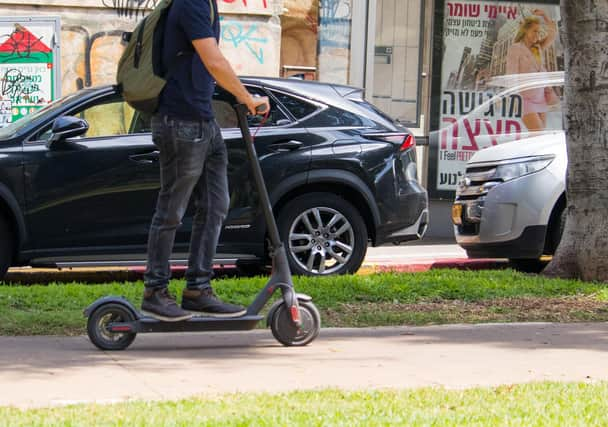MPs call for legalisation of electric scooters if pavement ban enforced


A consultation by the Commons’ transport committee found e-scooters could be an effective way to cut car journeys and clean up our air.
But it feared they could be dangerous to pedestrians if the vehicles - which can travel at speeds of up to 15.5mph - were used on pavements.
Advertisement
Hide AdAdvertisement
Hide AdThe National Federation of the Blind of the UK have called for an immediate halt to e-scooter rental trials in England and urgent action against their illegal use.
The committee heard evidence that local authorities would need extra funding to enforce any new safety restrictions introduced to govern e-scooters.
Due to their classification as a motor vehicle under the Road Traffic Act 1988, e-scooters cannot be used on the UK's roads - one of the last countries in Europe where this is the case.
The transport committee called for e-scooters to be opened up to everyone, even those without a licence, and helmets to be strongly recommended but not mandated by law.
Several areas, including Teesside, Hartlepool, Milton Keynes Borough, Northamptonshire, and the West Midlands have now signed up for the trial phase ahead of a potential national roll out.
Glasgow councillors will next week be recommended to approve the launch of Scotland’s first pilot rental scheme.
The city council said several other Scottish local authorities were also interested.
However, this could be delayed by the need for new legislation in Scotland to permit e-scooters using cycle paths.
Advertisement
Hide AdAdvertisement
Hide AdCommittee chair Huw Merriman said: "E-scooters have the potential to become an exciting and ingenious way to navigate our streets and get from place to place.
"If this gets people out of the car, reducing congestion and exercising in the open air, then even better."
But he added: "We need to ensure that their arrival on our streets doesn't make life more difficult for pedestrians, and especially disabled people.
"Before proceeding with plans to legalise the use of e-scooters, local authorities and Government must use the trials to monitor this closely, put enforcement measures in place and ensure they are effective in eliminating this behaviour."
The committee also emphasised the importance of designing a system to prevent "street clutter" whereby the dockless scooters are left all over the pavement causing a hazard.
It said e-scooter "parking hubs" should be considered to avoid the problem of e-scooters obstructing the pavement.
Sarah Gayton, shared space coordinator for the National Federation of the Blind of the UK, said: “We do not believe the rider behaviour will be able to be controlled and pedestrians will be put at risk if the trials go ahead in Glasgow.”
AA president Edmund King said: "We support the legalisation of e-scooters for use on the public highway, as long as certain safety criteria are met.
Advertisement
Hide AdAdvertisement
Hide Ad"As the safest option, we would support the use of e-scooters on extended dedicated cycle ways and recommend some form of training before setting off on the public highway."
The transport committee recommended that speed limits for scooters be set by local authorities but the AA said limits should be agreed at a national level.
A message from the Editor:
Thank you for reading this story on our website.
While I have your attention, I also have an important request to make of you.
With the coronavirus lockdown having a major impact on many of our advertisers - and consequently the revenue we receive - we are more reliant than ever on you taking out a digital subscription.
Subscribe to scotsman.com and enjoy unlimited access to Scottish news and information online and on our app.
With a digital subscription, you can read more than five articles, see fewer ads, enjoy faster load times, and get access to exclusive newsletters and content.
Visit https://www.scotsman.com/subscriptions now to sign up.
Our journalism costs money and we rely on advertising, print and digital revenues to help to support them.
By supporting us, we are able to support you in providing trusted, fact-checked content for this website.
Joy Yates
Editorial Director
Comments
Want to join the conversation? Please or to comment on this article.